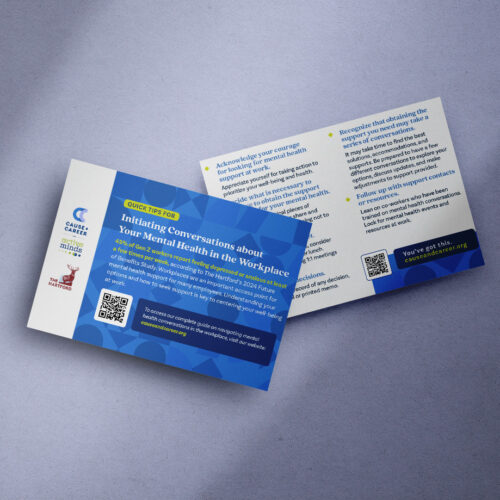The power of a single conversation can have a lasting impact on finding mental health support in the workplace. The Hartford’s 2024 Future of Benefits Study found one-third of U.S. workers reported feeling depressed or anxious at least a few times per week — this is higher for Gen Z with 45% noting feelings of anxiety or depression a few times a week. Workplaces are an important access point for mental health support for many people — employees and their families. Understanding your options and how to seek support is key to centering your well-being at work.
Initiating Conversations about Your Mental Health in the Workplace
There are different levels of disclosure around your mental health experience. Asking for tips on how to manage your workload is very different from requesting formal accommodations to support a mental health diagnosis. When deciding what or to whom to disclose, consider two variables, the role of the individual and the level of trust you have with that individual.
A trusted colleague or manager may not know the process of how to obtain formal accommodations, but may be able to validate your experience and refer you to someone who can provide that support. You may not know Human Resources staff personally, but they should be able to provide options for support.
If you are very concerned about the impacts of disclosure, you may consider asking general questions (e.g., what supports are available to support a worker’s mental health, what are the options for taking leave, who has been supportive on the team when someone was having a hard time) and/or consulting your employee handbook for information about supports, your rights in the workplace, and policies, such as absence and work schedules. Additionally, if you have a mental health diagnosis and are receiving care, talk with your care provider about how to navigate these conversations in the workplace.
Discover Who Can Address Your Concerns
Start a Conversation
Once you have identified who to connect with, use the tips below to engage in a supportive conversation.
Talking about your mental health is not always easy to do. Appreciate yourself for taking action to prioritize your well-being and health by using your company’s resources or entering into a mental health conversation at work.
Your colleagues, manager, and human resources do not need to know your whole personal history to be supportive of your mental health. Determine the personal critical pieces of information to share and feel comfortable with choosing not to disclose certain information.
In preparation for conversations that will include any formal requests, gather information about what supports your workplace currently has in place.
For informal conversations, consider meeting for coffee or over lunch. If you have regular 1:1s with your manager, consider including this on the agenda for the next meeting.
It may take some time to find the best solutions, accommodations, and supports needed for your mental health, be prepared to have a few different conversations to explore your options.
For any formal conversations made around workplace accommodations, be sure that both you and your manager or human resources document are documenting any decisions made.
For informal support conversations, these follow-up meetings can be casual updates. For formal support conversations, be prepared to discuss any positive notes and adjustments that need to be made to the support being provided.
Lean on co-workers who have been trained on mental health conversations. Look for mental health events at work and additional work-related support through organizations, such as SAMSHA, National Institute for Mental Health, and the Job Accommodation Network.
Signs to Recognize Mental Health Assistance is Needed
Prioritizing your mental health is important as you transition into the workforce and embark on your professional journey. Recognizing when you need additional support for your mental health is crucial for prevention of serious mental health conditions. Here are some signs to be aware of:
- There are noticeable changes in your behavior, such as irritability, mood swings, changes in sleep patterns (such as too much or not enough), eating (like loss of appetite), or withdrawal from social interactions. Your friends, co-workers, and loved ones have noticed behavioral changes too.
- You are experiencing physical symptoms, such as headaches, digestive issues, muscle tension, or fatigue.
- You are experiencing a decline in your performance at work, missing deadlines, making more mistakes than usual, or receiving feedback about your work quality.
- You are unable to carry out daily activities or handle daily problems at home or work, or there’s a decline in your personal care.
- You find yourself constantly feeling high-intensity of stress or overwhelmed by work responsibilities.
- You are having difficulty completing everyday tasks or finding it hard to concentrate at work due to persistent feelings of anxiety. You are engaging in persistent negative self-talk, self-criticism, imposter syndrome; thinking about suicide; or experiencing feelings of worthlessness.
Resources for Your Mental Health in the Workplace
Talking about your mental health can feel incredibly challenging due to the vulnerable nature of sharing information about yourself that is often private, and this can be even more difficult in the workplace setting. The fear of being judged, criticized, and discriminated against is a valid concern. As workplaces are becoming more supportive of employee mental health, there are many ways an employee can seek support for their mental health without disclosing personal information to colleagues. Look for resources in workplace communications or ask your human resources representative, manager, or trusted colleague about how to find and access these resources and others at your workplace.
If your workplace does not have any resources to support a positive mental health culture, you can advocate for implementing new initiatives at your company. Consider raising the issue during an ERG meeting or starting a new ERG focused on mental health, submitting feedback in an employee survey, scheduling a meeting with your Human Resources team/Wellness team, or speaking with your manager. The US Surgeon General’s Framework for Workplace Mental Health & Well-Being is a wonderful resource to support your advocacy efforts.
Employee Assistance Programs offers confidential and free resources to employees and their families to address different challenges one may experience. Counseling services can be offered as a resource through EAP, including counselors with cultural competence. Some programs offer a set number of sessions covered by your workplace with no cost to the employee or their family.
The health insurance provided at work may offer additional mental health networks or access to therapy via telehealth or digital apps.
Employers may offer wellness programs and initiatives to support employees mental and physical health. Examples of programs may include, programs that encourage movement and mindfulness, financial wellness incentives, flexibility to attend therapy sessions during working hours, wellness rooms/place for workers to practice self-care.
Employee Resource Groups or affinity groups are established at workplaces to provide peer-to-peer support for various identities, including ability, age, race, gender identity, etc. ERGs are helpful for employees to build a connection and community at work.
Employers may offer training programs to learn how to identify, understand and refer co-workers, friends, or loved ones to help.
Many workplaces hold educational events timed with key dates, such as Mental Health Awareness Month in May and World Mental Health Day in October.
Look for a mentor, colleague, or someone at work to avoid feeling lonely, especially if you are fully remote.
Mental health days are paid time off from work to allow workers to take care of their mental health. Some employers may offer Mental Health Days in addition to vacation and sick time.
Quick Tips Postcard
Understanding your options and how to seek support is key to centering your well-being at work. Download our printable PDF postcard and keep these tips at the ready for when you need it.


The Hartford
We’re helping employers understand how to dispel stigma in the workplace, which continues to be one of the biggest barriers for employees who need support. We’re educating, advocating, and creating programs that help dispel stigma associated with mental health, all while encouraging support and recovery


